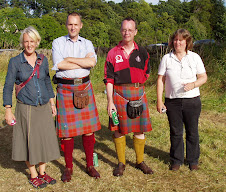Today’s excitement is lunch with Helen C.K.S. and the Fishwife. With only a little bit of luck, the former will be wearing Kaari and the latter will have tales, as yet unblogged, of her fibrous weekend in York. I will wear my green suede jacket, unseen since Christmas.
I’m glad to say that February 2, so far, is as dull and overcast as anyone could wish. We’re seriously thinking of going to Strathardle later this week, and I’m sort of scared. Of snow and of how we’ll find the house and of the possible absence of water. Indeed, of driving, which I haven’t done, except for the supermarket run, since November. We’ll want all the help a groundhog can afford.
Tennis: Southern Gal, your sympathetic note was the best possible way to hear the news. I toyed with the idea, when we got back from Mass, of turning the television on again, in case the match had miraculously metamorphosed into a five-set thriller. But I knew in my bones that it hadn’t, so had a quick look at the computer before lunch instead.
“often”: American and British dictionaries agree again, as with “pestle”, that the preferred pronunciation lacks the sound of the “t”. Over many years I have consciously modified my speech in a few respects in deference to the language that now surrounds me – the pronunciation of “tomato” and “shone” and “z” come to mind. I have dropped some vocabulary. I remember startling my hearers with “picayune” when I was an undergraduate in Glasgow, and I doubt if the word has passed my lips since. I’ve picked up some local words.
But I couldn’t possibly bring myself to pronounce the “t” in “often”. My husband does, and the Shorter Oxford even has a rude line about how the pronunciation of the “t” is common in the south of England. I polled our children once, and I think they split 50-50 just as the science of genetics would lead one to expect.
Gilbert has a rather tedious passage in The Pirates of Penzance punning “often” and “orphan” which strongly implies a general t-less pronunciation in late 19th century England, even in the south.
As Crassus was setting out from Rome on the expedition which ended with the loss of his army and his own life at the hands of the Parthians, a fig-seller wandered by shouting “cauneas”. Cicero tells the story, and says that Crassus would have done well to pay attention: “Cave ne eas!” means “Beware! Don’t go!” This anecdote makes better sense if “v” was pronounced as “w” in 1st century BC Rome, and is valuable evidence for that fact. As Gilbert’s pun is, perhaps, for “often”.
Knitting
I’ve done about 14 inches of the first sleeve, out of the 19 required before finishing off with a brief pattern band. I’m on a circular needle now, and continue to feel that I’m whizzing forward. I found another instance last night of the same mistake I had made in the body – knitting three rounds plain after a round of seeding, instead of the requisite two. It wouldn’t have mattered so much, at elbow height, but I took it out anyway.
Theresa, I will very much welcome any Harlequin measurements you can pass on. That side-to-side cardigan with the wavy stripes is stunning. What is the pattern? Did severe blocking solve the problem? I am sure the cat was what is called in our family A Very Great Help.
Subscribe to:
Post Comments (Atom)




It is funny how pronunciation differences can split families ;-)
ReplyDeleteI mock my husband for saying Pirth rather than Perth and berry rather than bury. However we both say the t in pestle and often. He was brought up in N.Ireland by an English mother and an American father, so who knows which influences won.
It would be interesting to know how S. Fishwife and CKS pronounce them.
All the best,
Dawn
I remember this as Candlemas, and wonder what the groundhog and pagan connections have with the feast of the purification. And is today the day as little Catholic school children we had our throats blessed to keep from choking on fishbones? Must go research St. Blaise. Please accept my sympathies on Mr. Murray's loss.
ReplyDeleteOften is one of those words that I carefully trained myself to pronounce. I grew up in North East Tennessee were the 't' in often was not only pronounced but emphasized. The letter 'r' was stressed too.
ReplyDeleteAnyway I didn't want to sound like a hill billy so I learned to speak "midwestern" although my roots show when I'm tired or upset.
The snow at rush hour last night played havoc with my plans for the evening so no measurements but I will get to it some time this week.
I'll do a blog entry shortly about the wavy sweater.
I am from Cumbria and would definitely pronounce the "T" in both "pestle" and "often". But then, I discovered just the other day, in discussion with my husband, that "nougat" is not pronounced "Nugget"!
ReplyDeletePronouncing a "t" in "often" has the distinct sound of a lower-class speaker trying to seem genteel-- as bad to my ear as saying "theAYter" for "theater".
ReplyDeleteBut why would you abandon a fine word like "picayune"? That deserves world-wide distribution.
-- Gretchen
I've watched plenty of British television and movies here in the States and I've never noticed anything about the letter Z. How is it pronounced over there? I think the 't' in often is always pronounced where I live in the Western US. At the very least it's pronounced (not to make a pun) as often as not.
ReplyDeleteMy mother had to be careful how she pronounced certain words when she lived in North Carolina for a year during the 1940s. I think the words were "hair", "car", and "dog." As long as she used the local pronunciation for those, people said she had lost her northern accent. In NH: hayah, cah, dahg (not exactly but dawg is wrong too). In NC: har, core, dorg.
ReplyDelete